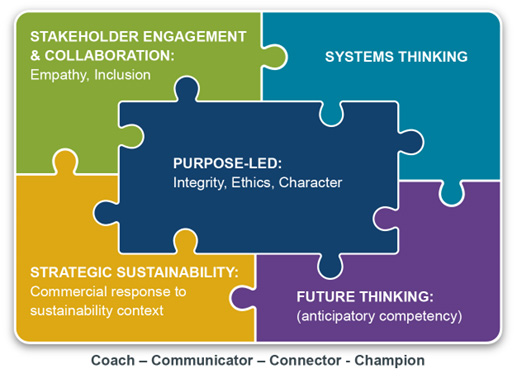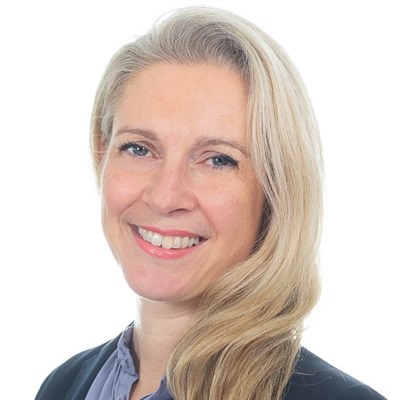Article by Dr Rosina Watson, Associate Professor of Sustainability, Head of the Sustainable Business Group, Cranfield School of Management | October 2023
I became Head of Corporate Responsibility at Argos in 2008, when our forward-thinking CEO, Terry Duddy, recognised the need for a senior leader to consider and manage the company’s wider environmental and social impact. It was around the time that Mike Barry launched Marks & Spencers’ pioneering Plan A, and Paul Polman set out Unilever’s Sustainable Living Plan. Terry asked me to do the job because I knew the business operations and people well having had eight years’ prior experience in the company across finance, strategy and commercial roles.
It was an amazing role. Finding ways to make the business more successful, at the same time as reducing our negative impacts, and even creating positive value for society gave me a renewed purpose. There were so many opportunities to be more efficient, to waste less, to help our customers and motivate our colleagues by thinking about planet and people as well as profit. Everywhere we looked there were opportunities to reduce cost, increase efficiency and improve our reputation. It just made good business sense and accordingly we called our sustainability programme “The Basis of Good Business.”
But it was also an extremely challenging role. Seeing the opportunities was one thing but making them happen was another. I had held senior roles before, but this one had some added dimensions: 1) it involved technical knowledge, but also softer skills such as influencing and storytelling; 2) it was much more outward looking, with more time spent talking to people outside the business, including competitors; 3) it was about challenging assumptions and the status quo, driving innovation and change and 4) hardest of all, it involved changing the narrative around what it meant to be a good business, and how to achieve and measure that.
I left Argos in 2013 to embark on a PhD at Cranfield which allowed me to become an academic. I thought I could have more impact as an individual by teaching others how to take their organisation down a more sustainable path, and since 2019 I have led Cranfield School of Management’s fast-growing Sustainable Business group.
But what capabilities do managers need to contribute meaningfully to a more sustainable future? And how can these be taught?
The case for education for sustainability
In the face of global social and environmental challenges, there is increasing pressure from customers, investors, and citizens for business to be part of the solution. The British Academy’s Future of the Corporation project defines the purpose of business to be “to profitably solve problems of people and planet, and not profit from causing problems” (The British Academy, 2019). This means that managers must now respond to the changing needs and expectations of a wider set of organisational stakeholders, in the context of a volatile, uncertain, complex and ambiguous (VUCA) environment. They need to lead their organisations in ways that contribute to solving society’s challenges rather than adding to them and play their part—in their value chains, communities, industry sector and wider society—in achieving systems change.
However, most organisations tend to find it difficult to manage towards measures of success beyond profit. They tend not to be very good at looking outside their boundaries to tackle problems that are not within their direct control, or that require partnership and collaboration to solve. Many professionals do not have the skills to make this complex and unchartered journey towards more sustainable business practices. As individuals, we can find it difficult to imagine the radical changes we will have to make in the way we live, work and do business if we are to bring human activity back into balance with the wider living world.
Sustainability education literature speaks of an urgent need equip managers with the competencies they need to transform management practices and lead their organisations towards a more sustainable future. This includes contributing to achieving the 2030 Sustainable Development Goals and the Paris agreement’s commitment to achieve Net Zero by 2050, as well responding to an ever-expanding set of sustainability-related regulations and reporting frameworks. We need leaders across all functions of business who are capable of working collaboratively to address complex sustainability challenges.
Addressing these shortcomings requires education that “empowers learners to take informed decisions and responsible actions for environmental integrity, economic viability and a just society, for present and future generations, while respecting cultural diversity” (UNESCO, 2020). Higher Education Institutions (HEIs) have a pivotal role to play in offering sustainability education that equips leaders to respond to their rapidly changing organisational contexts. This is particularly the case at postgraduate level, where many mid-career professionals return to study, full time or alongside their work. HEIs are attempting to embed sustainability into their missions and curricula, guided by international frameworks like the Principles for Responsible Management Education (PRME) initiative, and the inclusion of sustainability criteria into accreditation frameworks (e.g. AAACSB and EQUIS). There is certainly growing pressure for this from management students; a study by Yale Center for Business and the Environment found that 70% of business students want more experiential learning focused on sustainability; and 65% desire more case studies highlighting sustainability issues.
Competencies for sustainability
There is some consensus now emerging around the competencies for sustainability that need to be taught. As far back as 2011 Wiek, Withycombe and Redman synthesised the evidence on the required competencies for sustainability into a framework outlining the knowledge, skills, and attitudes necessary for successful task performance and problem solving with respect to real-world sustainability challenges and opportunities in businesses and management. It is composed of five key competencies which must be integrated to successfully co-create knowledge and action for sustainability. These are:
- systems-thinking competence
- anticipatory competence
- normative competence
- strategic competence
- and interpersonal competence.
More recently in 2021, Advance HE/QAA published its Education for Sustainable Development Guidance setting out eight key competencies for sustainability, based on UNESCOs key competencies for sustainability, which themselves build on Wiek et al's seminal framework. See Box 1 for an overview.
It is suggested that these competencies need to be taught and learnt though holistic, transformational learning approaches, because they demand relational learning and a questioning and evolution of people’s values and belief systems.
Research by the United Nations and global people advisory firm, Russell Reynolds identified four comparable critical capabilities which, when coupled with a sustainable mindset, underpin sustainable leaders’ success. These are:
- multi-level systems thinking
- stakeholder influence
- disruptive innovation
- and long-term activation.
Teaching sustainability competencies
It is clear from the research outlined above that sustainability skills and competencies are just as much about personal agency, influencing, leadership and critique of ‘business as usual’ as they are about applicable knowledge and skills to deliver more sustainable solutions.
So, what have we learnt at Cranfield about teaching these competencies?
First, you need interdisciplinarity. Leading for sustainability requires technical skills, but also management and leadership skills. You need to know how to measure a carbon footprint, but you also need to be able to drive a programme of change to reduce it. This means breaking down the silos between climate scientists and future CEOs so they can understand each other’s language and combine their knowledge and perspectives. For example, Cranfield’s Sustainability Business Specialist Apprenticeship is the first ever Cranfield course to be owned and delivered by two schools (School of Management and School of Water, Energy and Environment) bringing together natural and social scientists working on sustainability research more closely than ever before. It also means teaching people from many different business functions about sustainability, not just the sustainability/ESG team. At Cranfield, this means embedding sustainability into other management disciplines through new modules such as Economics for Sustainability, Personal Leadership for Sustainability and Sustainable and Circular Supply Chains.
Next, you need diversity. Diversity in cognition, knowledge, expertise, and perspectives are critical to create the necessary and urgent solutions to the societal challenges we face as a global community. As well as considering diversity within your workforce, this also means empowering people to look outside your organisation to see how others in your sector are responding to sustainability challenges, and working with competitors, suppliers and other societal actors (e.g. government, non-profits) to address systemic challenges. Learners on our Sustainability Business Specialist Apprenticeship come from diverse disciplines (from engineering to finance), with different levels of prior education; they work in private, non-profit and government organisations in sectors from defence to social housing. We create as much space as possible them to learn about, and from, each other, as well as from the course team, and this is widely recognised as contributing to the development of critical competencies including systems thinking, stakeholder engagement and collaboration.
Strategic sustainability. All too often, sustainability is seen as a tick-box exercise, a cost, or a distraction from core business. To counteract that, a powerful thread throughout our sustainability teaching is conceptualising sustainability as a core element of strategic formulation and execution. As Julie Owst, who is Head of Sustainability at Bidfood, and a Cranfield Sustainability Business Specialist Apprentice explained:
“When I started in the role, I was trying to hit everything in the UN Sustainable Development Goals, which is 17 goals. Rosina did a module on leading sustainable business which made me realise I need to do a materiality assessment and really look at how our business model is relevant to sustainability. The idea is to focus on less but to do more in that area. It’s improved our prioritisation, and our whole strategy has then changed. The business is then seeing the value that we’re delivering commercially too.”
Underpinning this, is the ability to identify and implement value creating innovation. Tools such as our Sustainable Value Analysis tool help managers to challenge the status quo and benefit from their collective diversity of thinking and understanding of stakeholders’ perspectives to envision product and business model innovation which creates environmental and/or social as well as economic benefits. It’s when sustainability initiatives generate value – for customers, for employees, for communities, and for the bottom line, that energy and momentum can be created.
Systems thinking is increasingly recognised as a core competence for sustainability, but it notoriously hard to teach on an accelerated timescale (it usually comes from experience!). Teaching systems thinking is not just about shifting thinking to a holistic viewpoint, but about helping managers to develop their understanding of the impacts and unintended consequences of decisions, both within their value chains and beyond into a sector or global ecosystem. There is also a need to help leaders consider much longer time horizons that typical in business strategy cycles, to consider multiple possible future scenarios that may unfold, and the risks and opportunities they present to their organisations.
One way we engage learners in system-thinking with a long-term perspective is through a role-playing game which takes participants on an experiential, transformational journey 2050. During the game, players representing established businesses interact with players representing entrepreneurs, policymakers, civil society organisations and citizens as they all react to changes in economy, technology, and society along alternative pathways towards a more sustainable future by 2050. The ‘winners’ are judged not only by the resources they accumulate, but by whether they have achieved their purpose. Participants reflect on the world they have collectively created through their beliefs, values and actions. They are encouraged to apply this learning to strengthen their leadership in the present.
Cranfield facilitated a half-day game-play experience for the management team of Environmental Service company, Lucion Group, intended to help the company align day-to-day decisions with its sustainability/ESG goals and group purpose. After playing the game, the management team experienced an immediate 20% uplift in their belief that they could contribute to sustainable futures as individuals and a 16% uplift in their belief that they could do this together as an organisation. Both figures increased by a further 3% in the six months after the learning experience. Participants in a follow-up focus group attributed this increase in agency to the understandings, awareness and relationships developed during the game. As Jeremey Meredith, Managing Director of Lucions Services reflected:
“The game was a truly immersive experience. It was thought-provoking and insightful and absolutely helped everyone who participated understand the scale of the challenges we face. Importantly, it helped us all to consider what we could do within Lucion Group to reduce our dependency on carbon. The message was clear, we must take action to hit and exceed carbon reduction targets by 2050 to safeguard our planet.”
Developing sustainability competencies in your organisation
With reference to the Cranfield Leadership for Sustainability competency framework, which distils the competencies outlined above, I’ll close with some practical suggestions of ways to build sustainability competencies in your leaders and your organisations.
Strategic sustainability
Your sustainability strategy should be tightly aligned or integral to you core business strategy. You can’t expect a small group of sustainability experts to ‘look after’ sustainability while the core business continues as usual. Sustainability is not just about the technical aspects of measurement and reporting of impacts. It is about changing the narrative around what your organisation is there to do and the value it creates and being able to win over the hearts and minds of your employees, helping them see how they can contribute to this. Think deeply about how you integrate sustainability into governance and core activities including strategy development, procurement, and financial reporting.
Stakeholder engagement
Many organisations are hiring from other industries, or even other sectors to increase their ability to understand and work with their stakeholders, including non-profits and even same-sector competitors. Deeper engagement with customers can be achieved through co-creating ideas and products, for example, through crowdsourcing. Volunteering and secondments can provide opportunities for employees to widen their understanding of and empathy with stakeholders.
Systems thinking
Participation in cross-functional projects and in industry-sector coalitions can offer employees a wider view of your organisation’s ecosystem.
Future thinking
Finding ways to bring in the voice of younger generations can provoke longer-term thinking. Some companies are building ‘shadow boards’ comprised of younger, next generation leaders who can offer this perspective. Setting longer-term company and personal targets can also help.
Purpose orientation
Activating a purpose beyond profit in your organisation can unleash the energy and creativity of your team in support of your sustainability strategy. Setting this wider purpose is a first step, but bringing it to life is the key, and this means connecting employees’ personal purpose to the wider purpose of your organisation. Some companies find B Corp accreditation useful – this involves a change to a company’s articles of association to explicitly allow directors to consider the interests of all stakeholders, not just shareholders, when making important decisions. A new ISO 37000 standard outlines how to govern for purpose.
Cranfield Leadership Competencies for Sustainability (David Grayson and Rosina Watson, 2023)
Cranfield helps many organisations to build the sustainability competencies of their leaders, through our Sustainability Business Specialist Apprenticeship, through Exploring Sustainable Futures game workshops and our Cranfield Executive Development programmes. Please get in touch if you would like to know more.
Read more about Sustainability at Cranfield School of Management in our latest Principles of Responsible Management Education (PRME) report.
Box 1: Eight competencies for sustainability
|
Competence [1] |
A student who displays this competency can: |
|
Ways of thinking |
|
|
Systems thinking
|
|
|
Anticipatory |
|
|
Critical thinking
|
|
|
Ways of practicing |
|
|
Strategic |
|
|
Collaboration |
|
|
Integrated problem-solving
|
|
|
Ways of being |
|
|
Self-awareness |
|
|
Normative competency |
|
[1] Based on the UNESCO/AdvanceHE/QAA framework.
[2] A broad approach to innovations with potential for causing harm when extensive scientific knowledge on the matter is lacking, emphasising caution, pausing and review.





